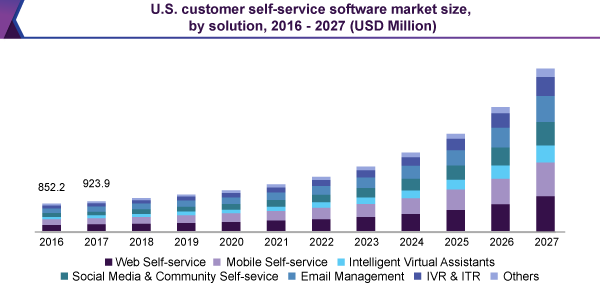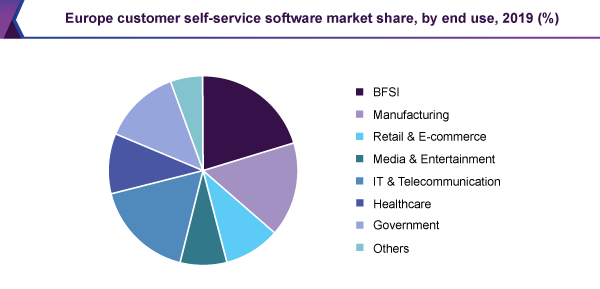- US: +1-408-610-2300
- Toll Free: +1-866-831-4085
- Become a Client
As per the published report, the global customer self-service software market size was prized by USD 7.12 billion in 2019. It is expected to observe a 22.1% CAGR from 2020 to 2027.
The organizations are putting their intense stress on distributing instantaneous information, as the role of the efforts, to augment efficiency and working competence, is expected to impel the growth of the market.
The important necessity, to build up superior relations with the consumers and increase the rank of the consumer experience, to keep hold of the existing consumers and fascinate new-fangled ones, is moreover anticipated to add to the escalation. The increasing demand from the consumers for well-organized services, by means of numerous contact positions, like the internet and smartphones, is mainly projected to encourage the enterprises, to accept customer self-service software.

The organizations are insistently arranging for the customer self-service software to fortify their contact with the consumers and propose their assistance on a 24x7 basis. Customer self-service software solutions permit enterprises to proficiently provide the altering necessities of their clients, in this manner increase the rank of the customer fulfillment and encouraging the retention of the customers.
Despite the administration of customer relations, customer self-service software is able to help organizations in supervising employee affairs. This way, enterprises can possibly save on the expenditures done on acquiring independent software, for the management of customer and employee relationships. These are the few most important factors, which are estimated to propel the expansion of the customer self-service software market, for the period of the forecast.
On the other hand, a short of consciousness between clients and uncertainty between the workforces, regarding the implementation of self-service software, is expected to restrict the development of the market to a definite level.
The sellers of self-service solutions frequently depend on different third parties, to supply the services of data hosting to their customers. In this way, some disruption in these services might have an effect on the process of the businesses, utilizing the self-service solutions.
Besides, the enterprises are conscious, prior to spending on self-service solutions, because of any possible violation of security, in the servers as well as the information systems of their third-party service supplier, that can place the secret information of their clientele, in danger.
The financial recession due to the eruption of the COVID-19 pandemic is estimated to make a tactical alteration in the buying norms of the enterprises, since the companies have initiated prioritizing the stability of the business, instead of investing in new-fangled services and solutions. Moreover, this is anticipated to restrict the development of the market, during the period of the forecast.
By way of holding more than 54% share of the customer self-service software market in 2019, the cloud segment led the market. Organizations are concentrating on updating their process of customer engagement, by means of implementing cloud-based architectures, which are capable to make possible the distribution of data, through a variety of functions.
Mainly the businesses are stressed, to adapt to the unexpected growth in call amount, in the midst of the eruption of the COVID-19 pandemic, and therefore are deploying AI-sourced virtual means, to help out their customers. Cloud-based virtual means can possibly conduct similar intents like a human manager, provide a conversational incident, present instantaneous plus on-demand services, and give automatic support.
The sector of on-premise deployment is expected to record a substantial enlargement, during the period of the forecast. On-premise deployment presents a variety of benefits, like trouble-free customization of software, consistent with the business procedures of the customer. Moreover, the on-premise deployment presents the capability to custom code the internal operations and assures total control along with possession to the client.
The sector of professional services dictated the customer self-service software market, in 2019, by way of holding 60% shares of the market. Increasing acceptance of Artificial Intelligence (AI) and analytics in computerization to improve the competence of the employees is expected to power the demand for professional services. These services are able to facilitate the configuration and deployment of self-service solutions together on-premise along with cloud deployment. The rising demand from the customers for the potential, for example, management of the program with project and superiority of the procedure, to assist the users in increasing their return on investment, is projected to propel the demand for professional services, for the period of the forecast.
The web self-service division led the market in 2019 by holding a 20% share of the market. On the basis of solutions, the market has been additionally segmented into IVR & ITR, email management, community and social media self-service, mobile self-service, intelligent virtual assistants, web self-service, and others.
The rising demand for the digital support method, which is able to permit customers and human resources to self-assist themselves, by means of offering appropriate records and performing regular responsibilities above the internet, is estimated to impel the demand for web self-service solutions during the forecast period. Web self-service resolution makes sure the experience of flawless service for the customers, through diverse routes of information.
The BFSI section retained more than 20% share of the customer self-service software market, in 2019 and ruled the market. Whereas the number of fintech startups publicized no symbols of reduction, moreover, the clients are slowly increasing the digital approach. This is considerably contributing to the digitalization of banking arrangements globally.

The implementation of self-service solutions, as a role of the digital banking approach, for the administration of the money, is expected to impel the enlargement of the BFSI sector. On the basis of end-use, the market has been additionally segmented into government, IT and telecommunication, retail & e-commerce, manufacturing, healthcare, media & entertainment, BFSI, and others.
In 2019, North America headed the global market by holding a more than 32% share of the revenue. The region is native land for the major software companies, such as Nuance Communications, Inc., Avaya Inc.; Verint Systems, Inc.; Salesforce.Com, Inc.; and Microsoft Corporation. The rising fame of social media networks and the increasing demand for cloud-centric deployment of self-service resolution are mainly pushing the expansion of the local market. Numerous benefits, like instantaneous admittance to the information, linked with software solutions, are projected to unlock the openings in the local market.
The companies are practicing various approaches for the enlargement such as mergers & acquisitions, tactical accord with partnership, and the development of innovative products, to keep on their challenging position in the market.
The manufacturing companies are spending vigorously on R&D actions to develop novel technologies as well as to improve the presented offerings. For example, Avaya Inc. provided USD 204 million for the R&D actions in 2019, to plan safe along with flexible, mobile as well as cloud-enabled resolutions.
• Verint Systems, Inc.
• Salesforce.Com, Inc.
• Nuance Communications, Inc.
• HappyFox Inc.
• Avaya Inc.
• Zendesk, Inc.
• SAP SE
• Oracle Corporation
• Microsoft Corporation
• BMC Software, Inc.
|
Report Attribute |
Details |
|
The market size value in 2020 |
USD 7.96 billion |
|
The revenue forecast in 2027 |
USD 32.19 billion |
|
Growth rate |
CAGR of 22.1% from 2020 to 2027 |
|
The base year for estimation |
2019 |
|
Historical data |
2016 - 2018 |
|
Forecast period |
2020 - 2027 |
|
Quantitative units |
Revenue in USD million/billion and CAGR from 2020 to 2027 |
|
Report coverage |
Revenue forecast, company ranking, competitive landscape, growth factors, and trends |
|
Segments covered |
Solution, service, deployment, end-use, region |
|
Regional scope |
North America; Europe; Asia Pacific; Latin America; MEA |
|
Country scope |
U.S.; Canada; U.K.; Germany; China; India; Japan; Brazil |
|
Key companies profiled |
Avaya Inc.; BMC Software, Inc.; HappyFox Inc.; Microsoft Corporation; Nuance Communications, Inc.; Oracle Corporation; Salesforce.Com, Inc.; SAP SE; Verint Systems, Inc.; Zendesk, Inc. |
|
Customization scope |
Free report customization (equivalent up to 8 analysts working days) with purchase. Addition or alteration to country, regional & segment scope. |
|
Pricing and purchase options |
Avail of customized purchase options to meet your exact research needs. |
This report forecasts revenue growth at global, regional, and country levels and provides an analysis of the latest industry trends in each of the sub-segments from 2016 to 2027. For this study, Million Insight's has segmented the global customer self-service software market report based on solution, service, deployment, end-user, and region:
• Solution Outlook (Revenue, USD Million, 2016 - 2027)
• Web Self-service
• Mobile Self-service
• Intelligent Virtual Assistants
• Social Media & Community Self-service
• Email Management
• IVR & ITR
• Others
• Service Outlook (Revenue, USD Million, 2016 - 2027)
• Managed Services
• Professional
• Deployment Outlook (Revenue, USD Million, 2016 - 2027)
• Cloud
• On-premise
• End-use Outlook (Revenue, USD Million, 2016 - 2027)
• BFSI
• Manufacturing
• Retail & E-commerce
• Media & Entertainment
• IT & Telecommunication
• Healthcare
• Government
• Others
• Regional Outlook (Revenue, USD Million, 2016 - 2027)
• North America
• U.S.
• Canada
• Europe
• U.K.
• Germany
• The Asia Pacific
• China
• India
• Japan
• Latin America
• Brazil
• Middle East & Africa (MEA)


Research Support Specialist, USA